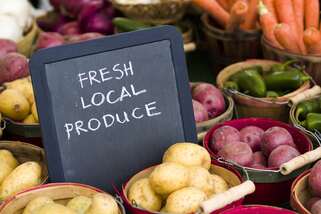
Eating locally grown agricultural products has a positive impact on the environment. Local farms that sell directly to their community can have higher soil quality because local consumption patterns can encourage a diversification of agricultural practices. Supporting local farms preserves open spaces in the community and stops the overdevelopment of rich agricultural areas. This protects soil fertility, water sources, and keeps carbon outputs low.
Unlike bigger farms, local farmers produce in-season harvests, which preserves the genetic diversity of crops. Eating out of season foods usually means that the produce was harvested before it reached peak flavor and nutritional value. One of the biggest ways eating locally produces food combats climate change is that is keeps carbon emissions low, as food travels less time to go from producer to consumer, which uses less fuel and generates less greenhouse gases. More than half of all the fruit, and about 1/3 of the vegetables purchased in the United States are imported from other countries. Along with generating fewer greenhouse emissions, locally grown food’s shorter travel time ensures that no spoilage and loses fewer nutrients during the time it takes to go from farm to table.
There are a variety of ways that local farms sell to the community. One of the main places to buy locally produced food is at a farmers’ market. Farmers’ markets are spaces where farmers sell directly to the consumer and allow for consumers to meet and build relationships with local farmers. In the Michiana area, there are multiple farmers’ markets that are daily (the South Bend Farmers’ Market) and weekly (the Mishawaka Farmers’ Market and the Urban Garden Farmers’ Market). Farmers’ Markets can be enjoyed by every member of the community, as those enrolled in the Supplemental Nutritional Assistance Program can use their benefits to purchase locally grown food at farmers’ markets in all 50 states.
Other places to buy local food is at a Cooperative, a business where a group of farmers (or other food producers) share a market space to sell their products. In South Bend, the Purple Porch Cooperative sells Green Bridge Growers lettuce and kale, as well as other locally grown produce and meats. These options are great ways to develop and maintain local economic health, and to build community.
 RSS Feed
RSS Feed
